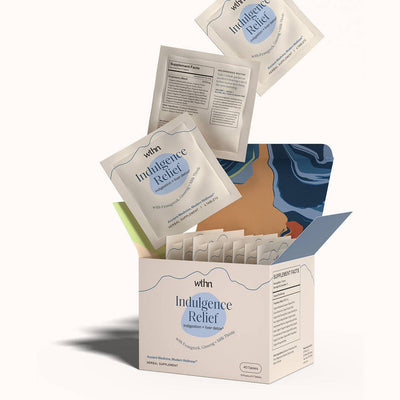When I was growing up, my sister always did collagen hair treatments. I wondered why she'd put this weird smelling beige gloop in her hair when the White Rain Tropical Coconut shampoo and conditioner smelled so much better (don't clown me, I was a child). It turns out she didn't want to smell funky; collagen is a protein long touted in the cosmetics industry for strengthening skin, hair, and joints. In recent years, collagen has become one of the need-to-have protein supplements.
What is collagen?
Collagen is a group of proteins found in your connective tissue that serves as the building blocks of bones, blood vessels, intestinal lining, joints, muscles, ligaments, and skin. Almost a third of the body's protein is made of collagen. But as we get older, generally starting in our 30s and 40s, the collagen naturally occurring in our bodies begins to deplete. So those crow's feet at the corner of your eyes or the joint pain you feel are likely due to reduced collagen.
Eating collagen-rich foods may help rebuild those building blocks in your skin and bones. Foods like bone broth, egg whites, chicken, garlic, beans, cashews, and citrus fruit have a bioavailable (fancy word for a substance the body can be absorbed and used) form of collagen. However, it is easier to digest collagen supplements because it is broken down.
What are the health benefits of collagen?
Whether you're replenishing your collagen reserves through food, supplements, or both, adding collagen to your diet can improve your health. Some benefits include:
- Improved skin health. Watch any wrinkle cream commercial, and you'll hear collagen mentioned. A scientific review of 11 studies found that those who took oral collagen supplements had enhanced skin hydration and elasticity.
- Stronger bones. Our bones weaken as we get older, especially after menopause. However, a long-term clinical study of collagen found enhanced bone density in postmenopausal women who took collagen peptides daily for a year. The researchers believe the improved bone density is likely due to the collagen-stimulating bone formation while slowing down bone loss.
- Stronger muscles. Studies show that collagen peptides help increase muscle mass and strength when combined with strength training.
- Improved gut health. Collagen contains glycine and glutamine, two amino acids with anti-inflammatory properties that have been shown to support gut health.
- Stave off joint disease. The cartilage in our joints is mainly made up of collagen. A study of patients with knee osteoarthritis found that those who took acetaminophen (Tylenol) with type 2 collagen (see below) had reduced joint pain while walking. Those patients also reported a better quality of life.
- Stronger heart. A small study of about 30 people found that when collagen tripeptides were taken twice daily, markers of atherosclerosis (a buildup of plaque in the artery walls) improved. Left untreated, atherosclerosis can cause coronary artery disease, leading to heart attack, heart failure, and other serious health problems. Researchers think collagen may help strengthen blood vessel walls to reduce artery disease risk.
How does collagen differ from other protein powders?
While collagen is a source of protein, these supplements shouldn’t be confused with protein powders that are dietary protein. Dietary protein, like soy or whey, has all nine essential amino acids that you need from your diet to build muscle and fuel metabolic functions (the things your body needs to do to maintain life). You can use dietary protein powders as a meal replacement as it will balance your blood sugar and keep you feeling fuller longer. While collagen doesn’t have all the essential amino acids, it is high in glycine, proline, and hydroxyproline, strengthening muscles and joints and smooths skin.
Additionally, collagen supplements don't come with a smell or taste (clearly, something was up with my sister's hair treatment). So, unlike whey protein, it's easier to incorporate into baked goods, teas, or a glass of water. The Fit In is launching a collagen peptide supplement that can easily dissolve in your favorite beverage or be added to a sweet treat to ensure your daily collagen dose.
How do you pick a collagen supplement?
Finding the proper collagen for you can seem complex because there are five common types of collagen from three common sources. Bovine collagen comes from cowhides and is excellent for improving gut and joint health. Marine collagen, which comes from fish skin, is ideal for the skin. Finally, chicken collagen, derived from chicken skin, has improved joint health, boosted immune health, and enhanced athletic performance. Unfortunately, there are no vegan collagen options available.
Bovine collagen contains Type 1 and Type 3 collagen. Type 1 collagen is the most common form of collagen found naturally in our bodies and accounts for 90% of the body's collagen stores. It's located just below the skin's surface and has been found to support healthy hair, skin, and nails. Type 3 collagen is the second most common form of collage found naturally in the body. In conjunction with Type 1, Type 3 supports gut health, muscles, blood vessels, and the uterus. In addition, several studies have found that Type 3 collagen helps restore depleted collagen levels for people living with inflammatory bowel disorders.
Marine collagen contains Type 1 and Type 2 collagen. There isn’t a wealth of research into the benefits of Type 2 collagen, but small studies that have been conducted found it can help reduce pain levels for people with osteoarthritis.
Chicken collagen has Type 2 collagen, including eggshell membrane collagen-containing Type 1 and Type 5. Type 5, which is found in the cornea, helps supports bone health, and emerging research has correlated its use with improved eye health.
There is also Type X collagen, which is being studied for its benefits on bone health. Researchers believe it could be beneficial to recover broken or damaged bones. However, there isn't a ton of research supporting its use yet.











Leave a comment